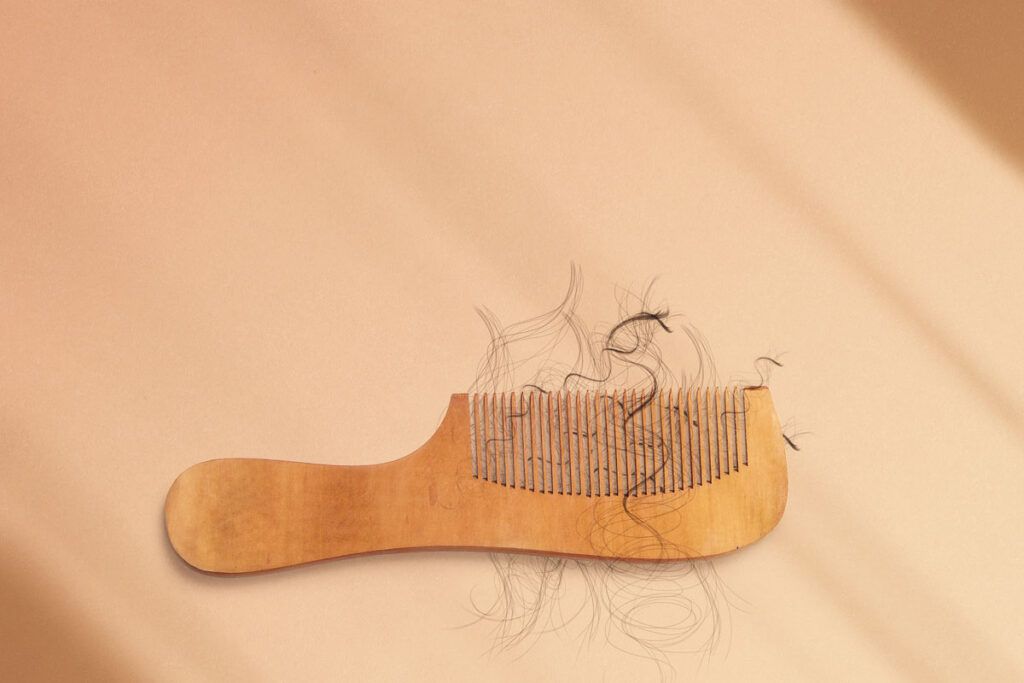Many people experience hair loss in the weeks after childbirth. This is a form of hair shedding called telogen effluvium.
Hair shedding can happen due to many stressors, but experts think a sudden drop in estrogen levels is the cause of postpartum hair loss. The condition has no treatment but typically resolves within 1 year.
Why does postpartum hair loss occur?

Hair loss experienced after giving birth is hair shedding. This phenomenon, technically called telogen effluvium, is when hair follicles enter a new stage of the growth cycle too soon. This can cause more hair than usual to enter the final and shedding phase of the cycle all at once.
The subtype of telogen effluvium that affects people after childbirth is called collective teloptosis. In this particular subtype, the hair cycles synchronize and cause molt-like shedding. You might experience what feels like large amounts of hair coming out all at once.
The exact reason why postpartum hair loss happens is unclear. Hormone levels vastly increase during pregnancy and rapidly decrease after delivery. Some hormones do affect the hair follicle cycle, including estradiol, which is a type of estrogen. Telogen effluvium after childbirth occurs from falling estrogen levels.
A 2023 study that surveyed 331 people who had recently given birth found that 91.8% self-reported hair loss.
How long does it last?
Postpartum hair loss typically starts about 2–4 months after delivery and lasts around 12 months. The peak shedding usually occurs at 4 months, with the usual fullness of hair returning 1 year after childbirth.
Although postpartum hair loss is usually temporary, triggers, such as severe stress or illness, can cause hair shedding from telogen effluvium to continue even after you are 1 year postpartum.
Treatment options for postpartum hair loss
Postpartum hair loss should resolve on its own. However, it may be helpful to use shampoo and conditioner specifically for thinner hair during this time.
You may also be able to help prevent further hair loss by:
- letting your hair air-dry
- avoiding heat styling with a flat iron or curler
- brushing gently with a soft brush
Although there are several treatments for other kinds of hair loss, such as finasteride (Propecia) for male pattern hair loss and spironolactone (Aldactone) for female pattern hair loss, there is no treatment for postpartum telogen effluvium.
Approved treatments for any type of hair loss can take many months to have an effect, during which time postpartum hair loss should get better on its own. If you do not experience a return to your usual hair thickness after 1 year, you might want to talk with a dermatologist.
Need a prescription or refill? You can get discreet and expert on-demand care in as little as 15 minutes with no video or appointment required. For $25, answer a few questions online and get a treatment plan from a board certified healthcare professional. Get started here.
How can you prevent postpartum hair loss?
There’s no way to prevent the drop in estrogen levels after you give birth. However, alongside avoiding overheating your hair, other steps can help prevent any type of hair loss.
This includes:
- avoiding chemical straightening, perming, coloring, and hair relaxing
- avoiding “tight-pull” hairstyles like ponytails
- if you smoke, trying to quit to avoid inflammation-related hair loss
- getting your recommended daily amount of calories to avoid hair loss from lack of nutrition
- eating foods containing important nutrients like iron and protein
Acute telogen effluvium can also occur due to sudden weight loss or low protein intake. It may be beneficial to speak with a doctor about healthy eating choices to help avoid postpartum hair loss.
Summary
It is common for people to experience hair loss 2–4 months after giving birth. Postpartum hair loss can last 6–12 months, but your hair should go back to its usual thickness by 1 year after delivery.
This type of hair loss is actually hair shedding and is called telogen effluvium. There’s no treatment for telogen effluvium as it resolves on its own. You can help prevent some types of hair loss by reducing stress on the hair and getting the right nutrition.
If you need help covering the cost of medications, the free Optum Perks Discount Card could help you save up to 80% on prescription drugs. Follow the links on drug names for savings on that medication, or search for a specific drug here.
